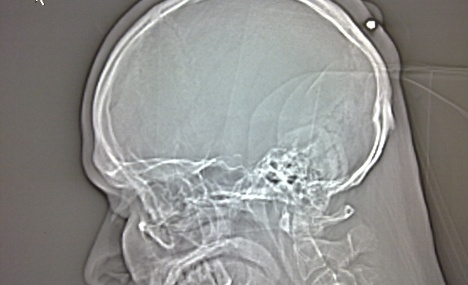The Polish construction worker in Herne doesn’t quite remember whether it was in 2004 or 2005, but he does recall feeling a forceful blow to the back of his head around midnight as he celebrated in the city centre, said Bochum police spokesman Volker Schütte.
He recently noticed a cyst on his head and went to the Herne hospital, where X-rays revealed the culprit – a 22-calibre bullet lodged in his scalp.
“He must really have a strong constitution,” said Schütte, who spoke with the patient while he recovered in the hospital following an operation on Friday. “He was of course intoxicated at the time he felt the blow. It was New Year’s Eve so naturally he’d had a bit more than usual to drink.”
Doctors informed police in the Ruhr Valley city immediately, and they are now searching for the shooter, who faces charges of negligent bodily harm.
Investigators believe that someone likely rang in the New Year with a shot, unintentionally hitting the man.
“The key, and this is obviously important and good for this man, is that the power behind the bullet was low,” Schütte told The Local. “Otherwise he would have sustained much more severe injuries.”
While investigators believe their chances of finding the New Year’s Eve shooter are low, the case could serve as an example to future revellers.
“Our next pre-New Year’s Eve safety campaign will now have an argument for telling people to leave their pistols in the gun safe because they’ll see what kind of damage can be done,” Schütte said.
The patient is expected to recover fully and will be released from the hospital in the coming days.




 Please whitelist us to continue reading.
Please whitelist us to continue reading.
Member comments